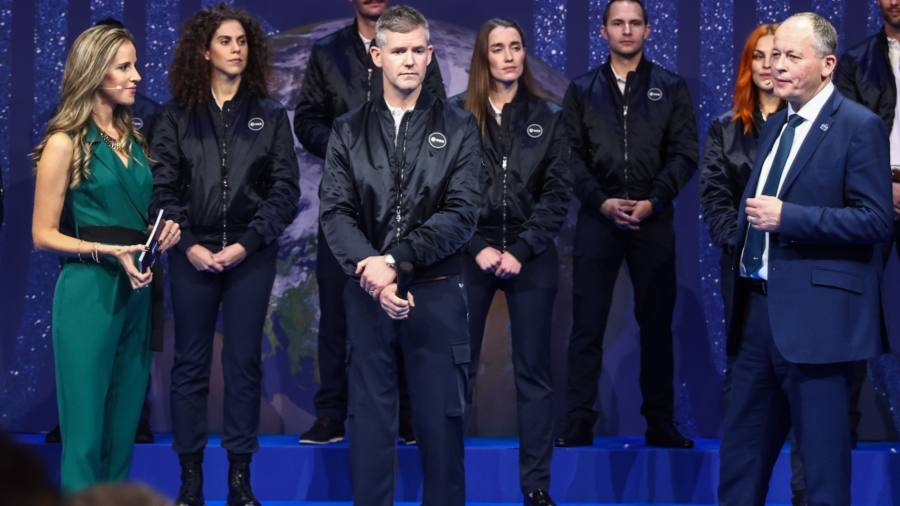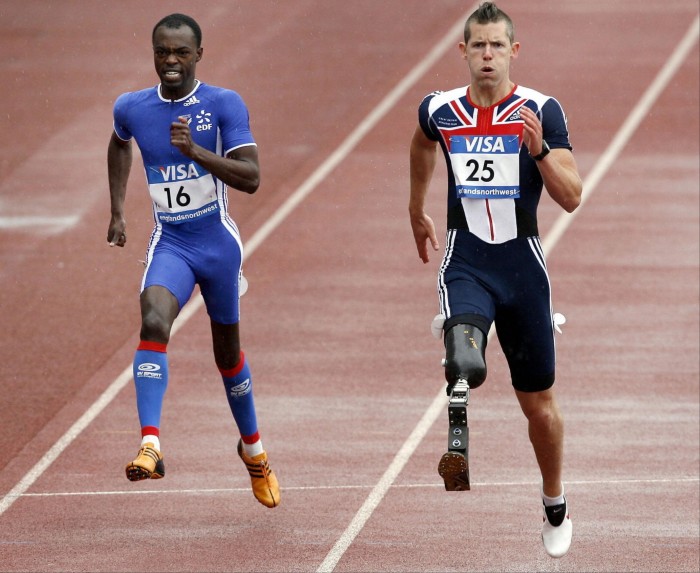
The European Space Agency unveiled 17 new members of its astronaut corps on Wednesday — including the world’s first para-astronaut — as its ministerial summit in Paris agreed to raise spending by 17 per cent to €16.9bn over the next five years.
John McFall, a 41-year-old orthopaedic surgeon from the UK, lost a leg in a motorcycle accident when he was 19 and went on to win a bronze medal for Great Britain as a sprinter at the 2008 Paralympic Games. He joins eight other men and eight women who will train for future opportunities to travel to the International Space Station, the moon and perhaps eventually to Mars.
The extra money allocated by Europe’s space ministers did not match the ambition of the agency’s leadership for a 25 per cent increase but Josef Aschbacher, ESA director-general, expressed satisfaction with the outcome.
“We didn’t get exactly what we asked, but we must put it in context,” said Aschbacher. “We received €10.3bn in 2016, €14.5bn in 2019, and now €16.9bn . . . in time of war, Covid-19 and an energy crisis.”
Bruno Le Maire, the French economy minister who hosted the meeting, called it “a success beyond our expectations. There will be three great space powers: the US, China — and Europe,” he said.
ESA is already “a first class partner” for Nasa, Aschbacher said. Armed with a firm new budget for the next five years, he will travel to Washington next week to discuss extending collaboration between the two space agencies.

The European power and propulsion module on Nasa’s Orion spacecraft “is performing flawlessly”, he said. Orion is currently visiting the moon on a test flight ahead of the lunar return by US astronauts planned for 2024. “I would like to see a European astronaut on the surface of the moon before the end of this decade,” he told the Financial Times.
The ministers agreed to extend European participation in the International Space Station to 2030, the decommissioning date envisaged by Nasa. They gave the go-ahead to a large lunar lander called Argonaut which will routinely send payloads to the moon during the 2030s.
In addition, an ESA project called Moonlight will build a telecommunications and navigation system with a constellation of lunar satellites. “We’re preparing the ground for a lunar economy — business on the moon,” said Aschbacher.
The UK-built Rosalind Franklin rover will make a long-delayed trip to Mars. Its launch on a Russian Proton rocket as part of ESA’s ExoMars mission, scheduled for September 2022, was cancelled as a result of sanctions following the Ukraine invasion. It is designed to drill almost two metres beneath the Martian surface to look for signs of microbial life.
ExoMars will be reconfigured with a new landing system and launched on an Ariane rocket in 2028. Aschbacher highlighted the decisions to press ahead with the Argonaut lunar lander and to revive ExoMars as big wins for European space and “a big relief for me personally and important for Europe”.
On earth observation, he said one of his first tasks would be to resolve the funding gap left by the UK’s exclusion from the EU’s Copernicus programme following Brexit. The UK plans to extract some £200mn of the £750mn that had been ringfenced for Copernicus to fund both ESA and national space programmes.
Aschbacher said the Paris meeting allocated a record €2bn in funding to programmes with commercial potential, one of his priorities when he was appointed in 2021. These included Boost 2.0, to support microlauncher projects, and Incubed, which is focused on developing commercially viable products and services in earth observation.
He rejected concerns that the European Commission might be increasing its hold over ESA, with new EU-funded programmes such as its Iris2 satellite constellation. The fact that member states had increased ESA’s funding was “a clear indication they want a very strong ESA and not an ESA funded by Brussels,” he said.
Europe’s space industry welcomed the ministers’ decisions. Jean-Marc Nasr, head of space systems at Airbus, said they were “a clear recognition of the importance of space, especially in the current economic and geopolitical situation”.
Meanwhile, the new ESA astronaut candidates, chosen from 23,000 applicants, will start at least two years of training next spring. They join seven members of the current ESA astronaut corps selected for training in 2009.
“When ESA announced they were looking for a candidate with physical disabilities, I thought it was really inspiring, a really brave and bold thing to do,” said McFall. “With my broad scientific background I felt compelled to try and help ESA answer this question: can we get someone with a physical disability to do meaningful work in space?”